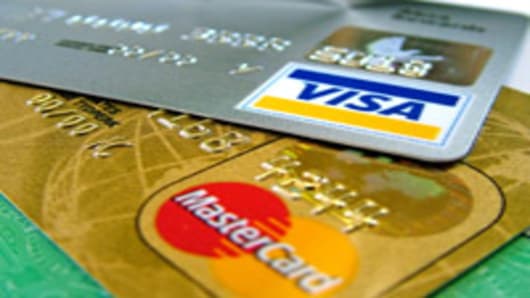Consumers paid down their credit cards and cut other debt in June for the fifth straight month as they rebuild savings battered by the recession.
Outstanding U.S. consumer debt fell by $10.3 billion, or 4.9 percent at an annual rate, to $2.5 trillion, the Federal Reserve said. That's a much steeper cut than the $4.7 billion analysts expected, according to Thomson Reuters.
June's reduction follows a 2.6 percent cut in May and a steep 8.2 percent drop in April, when consumers reduced their borrowing by $17.4 billion. That was the most in dollar terms on records dating back to 1943.
Widespread job losses, declining home values and reduced stock portfolios have spurred Americans to spend less and save more.
In the first three months of this year, Americans' net worth shrank by $1.3 trillion, the Fed has reported, due mainly to lower home prices and investment losses. Consumers responded by cutting back on their spending at a 1.2 percent annual rate in the April-June quarter, after a slight increase of 0.6 percent in the first quarter.
Americans' savings rate, meanwhile, jumped to 5.2 percent in the April-June period, the highest since 1998. While potentially a good thing in the long run, greater saving could slow any economic recovery, as consumer spending accounts for 70 percent of economic activity.
The five straight monthly declines in consumer credit mark the longest stretch of pullbacks since consumer borrowing fell for seven consecutive months from June through December 1991.
Consumer credit has fallen in eight of the last nine months, after the financial crisis worsened last September. That may also reflect the greater difficulty many consumers have had in obtaining auto loans and credit cards as banks tightened credit after reporting huge losses last year.
Total revolving credit outstanding — mostly credit cards — fell by $5.3 billion to $917 billion in June, the Fed said. Non-revolving credit — mostly auto loans — dropped by $5 billion to $1.59 trillion.
- CNBC Slideshow: Biggest Types of Personal Debt
- The Fed's report doesn't include mortgages or home equity lines of credit.
Consumers may be more willing to open their wallets later this year, if the jobs picture improves.
The unemployment rate fell in July for the first time in 15 months, to 9.4 percent, the Labor Department said Friday. Employers cut 247,000 jobs, fewer than analysts expected and down sharply from an average of almost 700,000 a month in the first quarter.
"The current ratio of consumer credit to disposable personal income is hovering near all-time highs. This suggests that future consumer credit could be throttled by the slowdown in disposable income and the weak labor market," wrote economists at Action Economics in a research note.
Fewer layoffs could help boost consumer sentiment. That's because those who are spending less now for fear of losing their jobs could grow more confident. If they start borrowing and spending more, it would help invigorate the economy.


